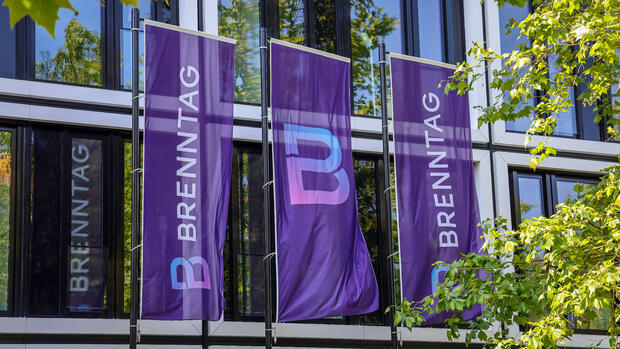Dusseldorf Shortly before the hard-fought supervisory board election at the Dax group Brenntag, German funds are behind the company. The investment companies Union, Deka and DWS each told the Handelsblatt that they will not vote for the candidates of the activist investor Primestone at the general meeting on Thursday.
Primestone wants to force the world’s largest chemical trader based in Essen to split up quickly. They are trying to increase the pressure with new supervisory boards. The British have put forward two of their own candidates, each of whom will compete against the controllers proposed by Brenntag.
The activist investor thinks his chances are good because influential US voting rights advisers have sided with him. The election has a signal effect beyond Brenntag: It is about the question of how well a hedge fund can assert itself with German companies with strategic demands.
With the positioning of the three large German funds, the distance between them and the British investors in the Dax group is increasing. The Brenntag major shareholders Kühne Holding from Switzerland and the German asset manager Flossbach von Storch want to vote for the candidates proposed by the company, as does the German Protection Association for Securities Ownership DSW.
US shareholder advisors ISS and Glass Lewis, on the other hand, recommend American and British funds to vote for Primestone’s candidates. In Germany, there has never been a situation where voting rights advisors opposed all new supervisory board members proposed by a company.
>> Read here: How activist investors want to hijack Brenntag
The US hedge fund Engine Capital is also supporting the British. It is not yet known how other larger Brenntag shareholders will behave. The large American investment companies Wellington and The Capital Group did not comment on the Handelsblatt.
Several US pension funds, some from Florida, have said they will follow the ISS and Glass Lewis recommendations. Traditionally, this tends to be done by smaller funds that do not prepare their own analyzes of the companies in which they invest worldwide. Brenntag is 60 percent owned by Anglo-Saxon investors.
DSW CEO Marc Tüngler says: “Brenntag is not primarily about the members of the supervisory board as individuals, but about the question of whether the group should be radically or not radically split up.” Primestone demands from Brenntag that specialty chemicals sales be separated from the bulk chemicals business to split off. The activist investor expects an increase in value from the announcement and rapid implementation. From his point of view, the management is not tackling the performance problems in specialty chemicals vehemently enough.
Brenntag does not reject a structural reorganization in the medium term. Several options are conceivable for this, according to company circles. However, the group must prepare for this step by step and in detail. This course is supported by the German shareholders.
Linus Vogel, ESG analyst at Deka Investment, says: “We currently do not think it is appropriate to escalate the elections for the two supervisory board positions at the upcoming general meeting.” You would like to accompany the further transformation path in exchange with the management and to find a common solution.
“This does not fundamentally rule out a split of the company at a later date,” explained Vogel. Flossbach von Storch also sees no need for hasty action. The management must deliver when it comes to increasing value, but “without acting with a crowbar,” writes the Brenntag shareholder.
The virtual general meeting on Thursday will be chaired by the acting Brenntag supervisory board chief Doreen Nowotne, who has announced her retirement. In the afternoon, the shareholders vote on the two vacant positions on the Supervisory Board. Brenntag supervisory board member Richard Ridinger is up against Primestone candidate Geoff Wild. Both are experienced in the chemical industry.
>> Read here: Top managers access these Dax companies
Ridinger was CEO of the Swiss fine chemicals manufacturer Lonza from 2012 to 2019 and previously accompanied the spin-off of the Henkel chemicals business into Cognis GmbH. The Primestone candidate Wild worked until August 2022 as head of the Berlin specialty chemicals company Atotech and previously managed the electronics chemicals manufacturer AZ Electronic Materials.
The Annual General Meeting on Thursday will decide on the future of the Supervisory Board.
(Photo: imago/Hans Blossey)
Two women are applying for the second vacant position on the Supervisory Board: Brenntag proposes Sujatha Chandrasekaran, who worked, among other things, as Chief Digital Officer at US toiletries manufacturer Kimberly Clarke. Primestone has nominated Joanna Dziubak, who worked at investment bank Goldman Sachs.
If the Brenntag candidates prevail, the procedure is clear: In its constitutive meeting, the new supervisory board would elect Richard Ridinger as the new chief controller, who wants the position. If the two Primestone candidates move in, it is unclear who will become the new chairman of the supervisory board. Brenntag’s supervisory body consists of only six members, as there are no employee representatives.
Dispute about procedure at the general meeting
In both cases it is foreseeable that the activist investor will continue to put pressure on Brenntag. That’s what company insiders assume. For months, both sides have been delivering a partly public debate with letters, statements and talks. The Annual General Meeting on Thursday is now the preliminary high point.
Before the meeting of the shareholders, the dispute also shows up about the procedure of the virtual meeting. Primestone accuses the group of making it technically more difficult for shareholders to vote for its countermotions. “We know of shareholders who represent a significant part of Brenntag’s capital and who are currently unable to cast their votes on the counter-motions,” says a letter to the incumbent Supervisory Board.
Brenntag denies the allegations. The company “to the best of its ability facilitated and simplified the voting process at the Annual General Meeting”. Brenntag has complied with all legal obligations and has “given comprehensive assistance” to the shareholders.
More: German companies are potential targets for activist investors

